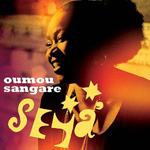|
|
 |
Dusted Reviews
Artist: Oumou Sangare Album: Seya Label: World Circuit Review date: Jul. 24, 2009 |

|
|
|
 |
Beginning with 1989’s Moussolou, Oumou Sangare has moved up the ranks from outspoken social outcast to Malian musical royalty. She’s built a hotel in Bamako, imported cars to Mali from China called Oum Sangs, and was appointed as Global Ambassador for the U.N.’s Food and Agricultural Organization in 2003. She’s lent her name to sacks of rice to help Malian farmers secure a spot in the marketplace. In short, Sangare is the international face of Malian contemporary music (all apologies to Toumani Diabate).
The title to the queen of African soul’s first album in half a decade is Seya or “Joy,” a sentiment that rings true every time the songbird of Wassoulou opens her mouth. It’s the kind of profound joy that’s jubilant but restrained, forceful but calm, and determined but never aggressive or out of control. Sangare’s commanding alto is sultry, thick and silky smooth, but never detached – rich not just in texture, but meaning as well.
“Oumou has always sung the truth,” said fellow musician and griot Binefou Keita, in a praise song interjected in Seya’s second song, “Sukunyali,” and he’s got a point. While her music is always joyful, Sangare uses her celebrity to raise social issues, speak to her fellow Malians, and fight against the oppression of women. The title track is a light but spirited song specifically dedicated to “the courage of Malian women”; Sangare celebrates the garment workers who dye the radiant “bazin” and “tissu wax” fabrics worn by women that fill her streets with color.
For Seya, Sangare amassed 50-plus international musicians, including Tony Allen from Nigeria and Neba Solo, Mali’s balafon-wielding pop star. From the U.S., James Brown saxophonist Pee Wee Ellis and trombonist Fred Wesley bring on the funk. The music is layered and polyrhythmic, and on “Wele Wele Wintou,” there’s a high energy Afro-funk groove that doesn’t quit. On the laid-back “DJingul,” the sounds of the balafon and the six-string kamele ngoni (“young person’s harp”) add to the sumptuous layers while keeping the vibe breezy.
That army of additional voices never get in the way of Sangare’s vaunted voice, and in that sense, Seya is really just more of the (excellent) same. You would never guess it’s been five years since Oumou when comparing the two albums – Sangare continues to find ways to experiment with traditional sounds and fluidly move between styles. It may be business as usual, but it’s business done with impeccable grace.
By Miki Kaneda
|







